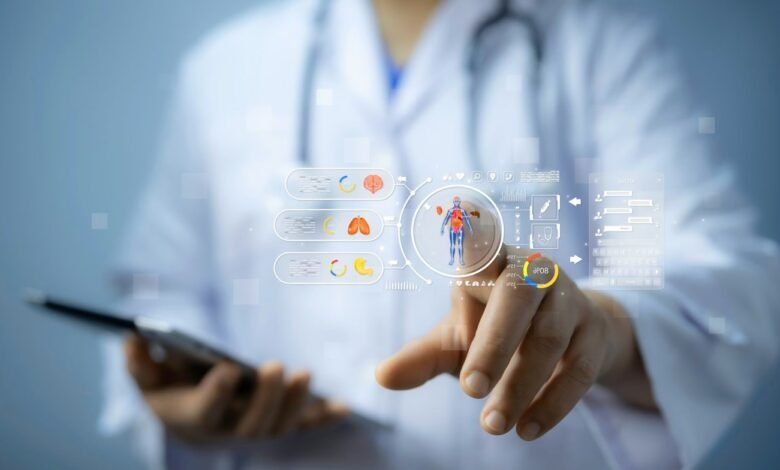
The healthcare sector in the United Kingdom is undergoing a transformative shift, driven by the integration of Internet of Things (IoT) technologies. These innovations are revolutionising healthcare by enhancing patient care, streamlining operations, and enabling data-driven decisions. From smart wearables to connected medical devices, IoT is reshaping how healthcare is delivered, making it more efficient, accessible, and personalised. This article explores the groundbreaking IoT innovations gaining ground in the UK, their impact on healthcare, and the challenges and opportunities they present.
What is IoT and How is it Revolutionising Healthcare?
The Internet of Things refers to a network of interconnected devices that collect, share, and analyse data through the internet. In healthcare, IoT encompasses smart devices such as wearable health monitors, remote patient monitoring systems, and smart hospital equipment. These technologies are revolutionising healthcare by enabling real-time data collection, improving patient outcomes, and optimising resource use.
IoT devices in healthcare include fitness trackers, smart insulin pumps, and connected imaging machines. These devices gather data on vital signs, medication adherence, and patient behaviour, which is then transmitted to healthcare providers for analysis. By facilitating continuous monitoring and early intervention, IoT is transforming traditional healthcare models into proactive, patient-centric systems. In the UK, the adoption of IoT is accelerating due to advancements in connectivity, government support, and a growing demand for efficient healthcare solutions.
For instance, IoT enables remote consultations, reducing the need for in-person visits and easing pressure on the National Health Service (NHS). It also empowers patients to manage chronic conditions, such as diabetes or hypertension, from the comfort of their homes. By harnessing data, IoT is revolutionising healthcare by fostering a more connected and responsive ecosystem.
Key IoT Innovations Transforming UK Healthcare
The UK is at the forefront of adopting IoT innovations in healthcare, with several technologies making significant impacts. Below are some of the most notable advancements revolutionising healthcare in the region:
1. Wearable Health Devices
Wearable devices, such as smartwatches and fitness trackers, have become increasingly popular in the UK. These devices monitor heart rate, sleep patterns, physical activity, and even blood oxygen levels. By providing real-time health data, wearables empower individuals to take control of their well-being while enabling doctors to track patient health remotely.
For example, devices like the Apple Watch or Fitbit can detect irregular heart rhythms, alerting users to potential atrial fibrillation. In the UK, such technologies are being integrated into NHS programs to monitor patients with cardiovascular conditions. This proactive approach is revolutionising healthcare by catching issues early and reducing hospital admissions.
2. Remote Patient Monitoring (RPM)
Remote patient monitoring systems allow healthcare providers to track patients’ health metrics outside traditional clinical settings. IoT-enabled devices, such as blood pressure monitors and glucose sensors, transmit data to clinicians in real time. This is particularly beneficial for managing chronic diseases, which affect millions of UK residents.
The NHS has piloted RPM programs in regions like Greater Manchester, where patients with conditions like COPD (chronic obstructive pulmonary disease) use IoT devices to report symptoms. These systems reduce hospital readmissions and enable timely interventions, revolutionising healthcare delivery by prioritising prevention over cure.
3. Smart Hospitals and Connected Equipment
Hospitals across the UK are embracing IoT to create “smart hospitals.” IoT-enabled medical equipment, such as connected ventilators and infusion pumps, ensures precise monitoring and maintenance. For instance, IoT sensors can alert staff when equipment needs servicing, reducing downtime and improving patient safety.
In addition, IoT facilitates asset tracking within hospitals. RFID tags and IoT platforms help locate wheelchairs, beds, and surgical tools, saving time and resources. The Royal Free Hospital in London has implemented IoT solutions to streamline operations, showcasing how these technologies are revolutionising healthcare infrastructure.
4. Telemedicine and Virtual Consultations
The COVID-19 pandemic accelerated the adoption of telemedicine in the UK, and IoT plays a critical role in its success. IoT devices enable virtual consultations by providing doctors with accurate patient data during remote appointments. For example, a patient using a connected thermometer or pulse oximeter can share readings instantly, allowing physicians to make informed decisions.
This shift is revolutionising healthcare access, particularly in rural areas where access to specialists is limited. The NHS app, combined with IoT devices, has made virtual care a cornerstone of modern healthcare delivery in the UK.
Benefits of IoT in Revolutionising Healthcare
The integration of IoT is bringing transformative benefits to the UK healthcare system. These advantages are driving its widespread adoption and revolutionising healthcare in profound ways:
Improved Patient Outcomes
IoT enables continuous monitoring, which leads to early detection of health issues. For example, IoT devices can alert doctors to abnormal vital signs, allowing for timely interventions. This is particularly impactful for patients with chronic conditions, as it reduces complications and improves quality of life.
Enhanced Operational Efficiency
IoT streamlines hospital operations by automating tasks such as inventory management and equipment maintenance. This reduces costs and allows healthcare staff to focus on patient care. For instance, IoT-enabled bed management systems ensure optimal bed allocation, addressing the NHS’s ongoing challenge of capacity constraints.
Personalised Healthcare
By collecting and analysing patient data, IoT enables tailored treatment plans. Machine learning algorithms, integrated with IoT systems, can predict health risks based on individual data, allowing for personalised interventions. This shift towards precision medicine is revolutionising healthcare by making it more patient-centric.
Cost Savings for the NHS
The NHS faces significant financial pressures, and IoT offers cost-effective solutions. Remote monitoring reduces hospital admissions, while predictive maintenance minimises equipment downtime. These efficiencies translate into substantial savings, enabling the NHS to allocate resources more effectively.
Challenges in Implementing IoT in UK Healthcare
While IoT is revolutionising healthcare, its adoption in the UK faces several challenges that must be addressed to maximise its potential:
Data Security and Privacy
IoT devices collect sensitive patient data, raising concerns about cybersecurity. High-profile data breaches, such as the 2017 WannaCry ransomware attack on the NHS, highlight the need for robust security measures. Ensuring compliance with GDPR (General Data Protection Regulation) is critical to protecting patient information.
Interoperability Issues
The UK healthcare system uses a variety of legacy systems, which can hinder IoT integration. Ensuring that IoT devices communicate seamlessly with existing infrastructure is a significant challenge. Standardised protocols and interoperability frameworks are essential for revolutionising healthcare effectively.
High Implementation Costs
Deploying IoT solutions requires significant investment in devices, infrastructure, and training. Smaller healthcare providers, such as rural GP practices, may struggle to afford these upfront costs. Government funding and public-private partnerships are crucial to overcoming this barrier.
Digital Divide
Not all patients have access to the technology or digital literacy required to use IoT devices. This is particularly true for older populations or those in underserved areas. Bridging the digital divide is essential to ensure that IoT innovations benefit all segments of society, truly revolutionising healthcare.
The Role of the NHS and Government Support
The NHS and the UK government play pivotal roles in driving IoT adoption to revolutionise healthcare. Initiatives like the NHS Long Term Plan emphasise digital transformation, with IoT as a key component. The government’s investment in 5G infrastructure and the NHSX digital innovation unit supports the deployment of IoT solutions.
For example, the NHS Digital Health Technology Standard encourages the development of secure and interoperable IoT systems. Additionally, partnerships with tech companies, such as Google Health and Microsoft, are accelerating innovation. These efforts ensure that IoT continues to gain ground, revolutionising healthcare across the UK.
Future Prospects: The Next Frontier in IoT Healthcare
The future of IoT in UK healthcare is promising, with emerging technologies poised to further revolutionise the sector. Artificial intelligence (AI) and machine learning will enhance IoT’s capabilities by enabling predictive analytics and personalised care. For instance, AI-powered IoT devices could predict heart attacks or diabetic crises with unprecedented accuracy.
The rollout of 5G networks will also boost IoT performance, enabling faster data transmission and supporting complex applications like robotic surgeries. Furthermore, advancements in edge computing will allow IoT devices to process data locally, reducing latency and improving efficiency.
As IoT continues to evolve, its integration with other technologies, such as blockchain for secure data sharing, will further transform healthcare. The UK is well-positioned to lead this revolution, with its strong healthcare infrastructure and innovative tech ecosystem.
Conclusion: A New Era for UK Healthcare
IoT innovations are revolutionising healthcare in the UK by enhancing patient care, improving operational efficiency, and reducing costs. From wearable devices to smart hospitals, these technologies are transforming how healthcare is delivered and experienced. While challenges like data security and interoperability remain, the NHS and government are actively addressing these issues through strategic investments and policies.
As IoT continues to gain ground, it promises to usher in a new era of healthcare that is more connected, efficient, and patient-focused. By embracing these innovations, the UK is not only improving its healthcare system but also setting a global standard for digital health transformation. The journey towards revolutionising healthcare is just beginning, and IoT is at its heart.







